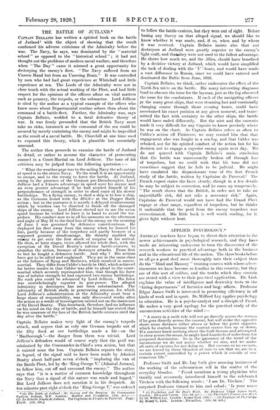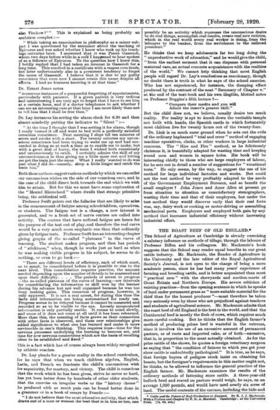APPLIED PSYCHOLOGY.*
AMERICAN teachers have begun to direct their attention to the
newer achievements in psychological research, and they have made an interesting endeavour to turn the discoveries of the research workers to practical advantage both in the business and in the educational life of the nation. The three books before us all go a good deal more thoroughly into their subject than do the "Mind and Memory " training courses with whose adver- tisements we have become so familiar in this country, but they are of this sort of calibre, and the truths which they contain are stated with a view to their practical application. Dr. Link explains the value of intelligence and dexterity tests to the
"hiring departments" of factories and large offices. Professor Edgar James Swift is interested in promoting efficiency in all kinds of work and in sport. Dr. Wilfred Lay applies psychology to education. He is a psycho-analyst and a disciple of Freud. He makes a very good apology for the practical study of the unconscious activities of the mind :- " A rower in a swift tide will not go directly across the stream if he goes directly across the current, but will strike the opposite shore some distance either above or below the point opposite which he started, because the current carries him up or down. If a mariner knew nothing about the Gulf Stream and attempted to steer across the ocean, he might land hundreds of miles from his purposed destination. So in the ignorance of the trend of the unconscious we do not arrive whither we aim, and we make all sorts of excuses for not doing so. But excuses or no excuses, we are forced by these blunders of ours to see that we are to a certain extent controlled by a power which is outside of our conscious life."
Professor Swift and Dr. Lay loth give amusing instances of the working of the subconscious self in the matter of the everyday blunder. " Freud mentions a young physician who timidly and reverently introduced himself to the celebrated Virchow with the following words : I am Dr. Virchow.' This surprised Professor turned to him and asked : Is your name • (1) Psychology and the Day's Wort. By Professor Edgar Jame Swift. London Allen and Unwin. [108. Gd. net.1—(2) The Child's Unconscious It fad. By Dr. Wilfred Lay. London : Kegan Paul. (1013.1—(3) Employment PsyeaLiphi. By Henry C. Link. London : Macmillan. 110s. Gd. net.) also Virchow ? ' " This is explained as being probably an ambition complex :-
"While taking an examination in philosophy as a minor sub-
Ect I was questioned by the examiner about the teaching of picurus and was asked whether I knew who took up his teach- ings centuries later. I answered that it was Pierre Gassendi, whom two days before while in a café I happened to hear spoken of as a follower of Epicurus. To the question how I knew this, I boldly replied that I had taken an interest in Gassendi for a long time. This resulted in a certificate with a magna cum lauds, but later unfortunately also in a persistent tendency to forget the name of Gassendi. I believe that it is due to my guilty conscience that even now I cannot retain this name despite all efforts. I had no business knowing it at that time."
Dr. Ernest Jones notes " numerous instances of a purposeful forgetting of appointments, particularly with patients. If a given patient is very tedious and uninteresting I am very apt to forget that I have to see him at a certain hour, and if a doctor telephones to ask whether I can see an interesting case at that hour I am more likely than not to tell him that I shall be free then."•
Dr. Lay instances his setting the alarm-clock for 6.30 and then absent-mindedly putting the indicator to " Silent " :- " At the time I thought that I was setting it for alarm, though I really turned it off and went to bed with a perfectly satisfied conscious conscience. Next morning I slept till ten minutes of seven and awoke with a start. For twenty minutes my uncon- scious conscience had been trying to wake me up and had suc- ceeded in doing so at such a time as to enable me to make, but with a great deal of hurry, the train I wished both consciously and unconsciously to catch. I certainly admire the skill of my unconsciousness in thus giving me a little more rest and letting me get the train just the same. What I really :wanted to do was just what I did do—namely, sleep a little longer and catch the train too."
Both these authors suggest various methods by which we can enlist our unconscious wishes on the side of our conscious ones, and in the case of the child direct both towards the end which we wish him to attain. But for this we must have some exploration of the " Mental Hinterland " where dwells that strange primitive being, the subliminal self.
Professor Swift points out the fallacies that are likely to arise in the measurement of fatigue among schoolchildren, operatives, or students. The fatigue test is a change, a new interest is generated, and so a fresh set of nerve centres are called into activity. The centres that have suffered fatigue are hence for the purpose of the teat out of play, and therefore the real curve would be a very much more emphatic one than that ordinarily given by fatigue tests. Professor Swift has an interesting chapter giving graphs of the so-called " plateaux " in the curve of learning. The student makes progress, and then has periods of "stickiness," when, though ho works just as hard as when he was making visible progress in his subject, he seems to do nothing, or oven to go back :-
" There are different levels of efficiency, each of which must, so to speak, be consolidated before it is possible to rise to the next level. This consolidation requires practice, the amount needed depending upon the number of details to be mastered and upon their difficulty. . . . The periods of arrest in progress —the so-called plateaux of the curve of learning—are intervals for consolidating the information or skill won by the learner during his advance but not well organized because he was too busy making gains. This cessation of progress, however, is only apparent. It is not a real arrest, for during this time the facts and information are being automatized for ready use. Progress seems to be delayed because it cannot be measured and recorded so as to be visible to the eye. Loosely accumulated information is only partially usable. It comes to mind slowly, and some of it does not come at all until it has been relearned. More than this, the meaning of facts grows as their connection with other facts is observed, and these new relationships give added significance to what one has learned and make it more serviceable in one's thinking. This requires time—time for the nervous processes underlying the learning to become set, and time for new nervous connections which are the basis of recalling ideas to be established and fixed."
This is a fact which has of course always been widely recognized by athletic coaches.
Dr. Lay pleads for a greater reality in the school curriculum, for he says that when we teach children algebra, English, Latin, and French we frustrate the child's unconscious wish for superiority, for mastery, and victory. The child i9 conscious that the work which he has been given, strive he never so hard, has yet been better done by hundreds of other older students, that the exercise on irregular verbs or the " history theme " he produced with so much pain can be found better done in a grammar or in a book of essays by Fronde :- " I do not believe that the most educative activity, that which draws out of a man or woman the best that is in him or her, can
possibly be an activity which represses the unconscious desire to do real things, accomplish real results, create real new entities, which in the real world every real worker is doing, from the labourer to the banker, from the switchman to the railroad president."
He thinks that we keep adolescents far too long doing the " unproductive work of education," and he would give the child, " from the earliest moment that it can dispense with personal maternal oars, an actual concrete acquaintance with the realities of the world." We cannot help thinking that most English people will regard Dr. Lay's conclusions as reactionary, though no doubt there is truth in what he says of the school exercise. Who has not experienced, for instance, the damping effect produced by the contrast of the neat " Summary of Chapter v." at the end of the textbook and his own illegible, blotted notes on Professor Buggins's fifth lecture ?- "Compare their merits and you will Admit the insect's greater skill."
But the child does not, we believe, usually desire too much reality. For reality is apt to knock down tho veritable temple not built with hands, the Spanish castle in which fortunately most children live for twenty hours out of the twenty-four.
Dr I ink is on much surer ground when he sets out the evils of the ordinary haphazard " trial and error " method of engaging machine operatives, clerks, or other workers in large industrial concerns. The " Hire and Fire " method, as he felicitously christens it, is beautifully adapted for wasting time and keeping round men and women in square holes. His book will be interesting chiefly to those who are large employers of labour, for he sets out in detail a number of suggestions for " vocational teats." He only seems, by the way, to suggest the use of his method for large individual factories and works. But could not the test method be very profitably adapted to the needs of the Government Employment Bureaux, and so benefit the small employer ? John Jones and Anne Allen at present go from situation to situation as unsatisfactory stenographers, wasting their time and that of their employers, but under the teat method they would discover early that their real forte was, say, dairy work or cooking or motor-driving or assembling mechanical parts. Employers and employed both gain by any method that increases industrial efficiency -without increasing industrial effort.



































 Previous page
Previous page